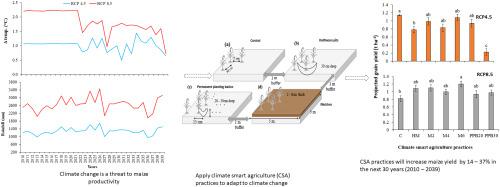Agricultural Systems ( IF 6.6 ) Pub Date : 2022-03-17 , DOI: 10.1016/j.agsy.2022.103407 Alex Zizinga 1, 2, 3 , Jackson-Gilbert Majaliwa Mwanjalolo 1, 2 , Britta Tietjen 3 , Bobe Bedadi 4 , Himanshu Pathak 5 , Geofrey Gabiri 6 , Dennis Beesigamukama 7, 8

|
CONTEXT
Climate change continues to affect maize production, food security and livelihoods of smallholder farmers in most of the developing countries. Climate smart agriculture (CSA) practices can enhance agricultural production by alleviating adverse climate effects on maize productivity through improved soil moisture storage, water use efficiency, increased soil carbon (C) and nutrient supply with long-term resilience to climate change.
OBJECTIVE
This study investigated the effectiveness of CSA practices (mulching at 0, 2, 4 and 6 cm thicknesses), permanent planting basins (20 and 30 cm deep), and halfmoon pits as a mitigation and adaptation strategy for improving maize productivity in rainfed production systems in the sub-humid regions of Sub-Saharan Africa.
METHODS
We used the AquaCrop model of the Food and Agriculture Organization (FAO, 2018), AquaCrop version 6.1 to evaluate potential benefits of the CSA practices: half-moon, mulching (using different thickness) and permanent planting basins compared to a control treatment in rainfed production systems. The performance of CSA practices was evaluated using field experiments under present and future conditions. We first parameterized the model based on a three-season field experiment (2019-2020). We then run the model under projected future trends (2010–2039) using four general circulation models in each two greenhouse gas (GHG) emission representation concentration pathways (RCP4.5 and RCP8.5) for the Coupled Model Inter-comparison Project 5 (CMIP5). Finally, we evaluated resulting maize growth, grain yield, and water use efficiency for all the treatments.
RESULTS AND CONCLUSIONS
Our results indicated that use of mulching, especially 6 cm thick mulch increased maize grain yield and water use efficiency under present and future conditions. It was noted that CSA practices would increase grain yield by 14–37% under RCP8.5 climate scenario. Projections revealed increases in mean temperature of 0.5 °C and 1.0 °C under RCP4.5 and RCP8.5, respectively, in the 30 years (2010–2039). The model also projected a decrease (4.7%) and increase (2%) of the annual averages of rainfall in the future under RCP4.5 and RCP8.5, respectively.
SIGNIFICANCE
Our findings highlight the key role of CSA practices in reducing the climate change effects on maize production in the sub-humid regions. Therefore, national governments should prioritize adoption of climate smart agriculture practices as a key strategy for improving and sustaining maize productivity in rainfed systems of the sub-humid region.


























 京公网安备 11010802027423号
京公网安备 11010802027423号